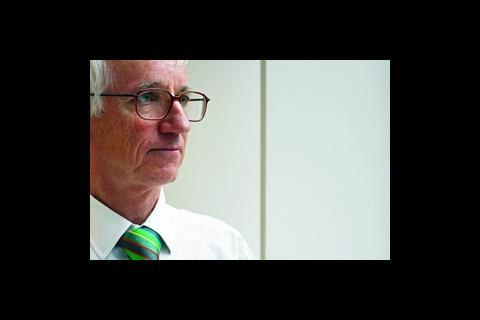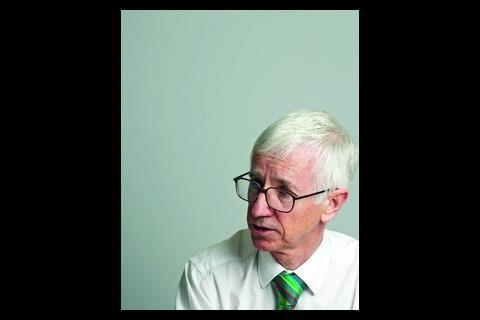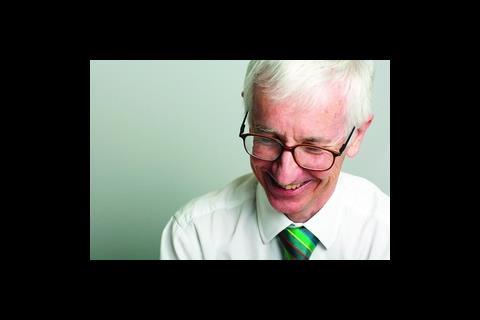Former CIBSE chief executive Andrew Ramsay fought hard to get members recognised as chartered engineers. He talks to Will Jones about the battles he is now waging at the Engineering Council
Pedalling furiously out of the capital a couple of months back, Andrew Ramsay, chief executive of the Engineering Council UK, had CIBSE to thank as he set off on his eighth London to Brighton Bike Ride. It was the substantial farewell collection by his colleagues that prompted him to buy a new mountain bike when he left the institute a decade ago. “I hadn’t cycled for years, but the CIBSE staff’s generosity got me restarted,” he says. “I’m grateful to them for that and for the exciting time I spent working there.”
Ramsay joined CIBSE in 1979: chartered secretary qualifications, in addition to his chartered engineer status, landed him the role of deputy chief executive at the Chartered Institute of Building Services, as it was called then. He took over as chief executive in 1984 and ran the institution for another 13 years. In this time, potentially the most important development he championed was gaining recognition for CIBSE with the Engineering Council.
“Building services engineers have been downtrodden historically,” Ramsay says. “In 1947 the Institute of Heating and Ventilating Engineers (IHVE) applied to the Privy Council for a Royal Charter but this was blocked by the big three institutions – mechanical, electrical and civils – and that blocking went on until 1976, when the Department of the Environment decided we deserved to be recognised with a charter and arranged, despite protests, for the IHVE to become the Chartered Institution of Building Services.
“The fact that the ‘E’ for engineers wasn’t on the title speaks volumes. The big institutions insisted they didn’t want this new organisation to be recognised as an engineering body. It was quite a nasty time and I joined an institution that was constantly fighting. From 1979 to when I left, we were battling to try and improve the position of CIBSE.”
In 1979 the Finniston report was published, damning the set-up and management of the major engineering institutions. It called for a body to be set up to regulate them and in 1982 the Engineering Council was established. “This new quango felt obliged to consider all applications for recognition and CIBSE was first in the queue. Nevertheless we still had to fight like fury to get our membership recognised as chartered engineers,” says Ramsay.
Now, as head of the Engineering Council, Ramsay is still battling. Today’s struggles centre on international recognition and a chronic shortage of engineers. “Part of the ethic of the Engineering Council is to ensure the system can deliver the standard of people required to become engineers both demographically and within education,” he explains. “We take a deep interest in what is going on and are co-sponsors of the ETB document Engineers UK, a set of statistics published each year that cuts through the nonsense so often spouted about the shortage of engineers and threats from abroad, much of it is counterproductive.
“Organisations like the CBI trumpet that the government must encourage more young people to become engineers: people hearing this think ‘why would I want to become cannon fodder in an industry that’s not doing well?’. There is also bleating about how the best graduates go off and work in the City. Well, I think the fact that an engineering degree allows you to find any well-paid career is a positive feature.”
Ramsay punctuates his remarks with quickfire statistics. “A larger proportion of graduate engineers go into engineering than graduate architects go into architecture: 47-48% of graduates’ first jobs are recognisably engineering and many come back to it later.”
He believes the biggest constraint on engineering is a lack of mathematical ability. “The number of people coming out of sixth form or college with A level grade A to C is stuck at 40,000 to 44,000 a year,” Ramsay explains. “The single most important thing we could do to increase the supply of engineers is get more and better maths teachers.
To increase the supply of engineers we need more and better maths teachers
“But I’m not just bleating about this. In 2002 I became chairman of a steering group which investigated whether it was possible to teach
A level further maths to people around the country.” The group was a reaction to the falling numbers of those wanting to take the subject. This had led to it becoming uneconomic for schools to offer further maths. “You have to remember, we’re not in those halcyon days of the 1970s when you could take any A level you chose.”
Ramsay and his team set up the three-year project to see if it was possible to teach maths using fewer people. It encompassed a variety of experiments including day release, weekend schools, using the internet, DVDs and coaching for teachers. The project was hugely successful; virtually all the pupils got good A levels in further maths. The DFES took an interest in the results but didn’t act upon them until an inquiry into the state of maths in schools, set up by the then Education Secretary Charles Clarke, came out with a indictment of the whole system of maths teaching. The DFES was told to fix it and Ramsay’s £300,000 three-year project turned into a £7 million initiative. The result is the Further Maths Network: 47 centres which produced a 25% increase in the number of people who took and passed further maths last year.
From an international perspective, Ramsay believes we have to go global to realise the true benefits for engineering. “The reason it has become so important is because of the electronic age. Firms work internationally from a desk in London but worldwide recognition of UK qualifications and status isn’t always forthcoming,” he says.
“There is a global body called the World Federation of Engineers but it’s a pretty limp organisation. However, a group of national bodies agreed the Washington Accord in 1989. Originally, eight countries – the UK, Ireland, US, Canada, New Zealand, Australia, South Africa, and Hong Kong who have similar higher education systems and training and testing regimes for engineers made a cosy agreement to recognise each other’s graduates.” At the turn of the new millennium other countries began to get involved. Japan and Singapore have now joined, Germany and Malaysia are waiting to and China and India are pushing to be allowed in.
“This is no guarantee that as a chartered engineer you’ll be recognised in another country, even one involved in the Washington Accord,” says Ramsay. “It merely means that if you have the qualifications you’ll be considered, but you may have to take local tests to demonstrate your proficiency.
“We are on the case, though. Four of our people recently went to Washington for a round of meetings on protocol developments and to discuss problems within the accord countries about recognition. Bit by bit we are establishing the importance of the chartered engineer and indeed the incorporated and engineering technician qualifications internationally. At home, we are helping to improve the recognition of engineers in the eyes of the public and politicians.
“The fact of the matter is that university graduates average around £15,000 of debt. School leavers and their parents are now looking to disciplines in which they stand a chance of getting a job when they graduate, and engineering comes high on that list.”
As he rides off towards his next fight, Ramsay is as dogged as ever. He’s not quite so bullish when it comes to cycling though. “I don’t shave my legs like the real speedsters. People might think I’m meant to be good and wonder why I’m going so slowly,” he laughs. Here’s a man who knows how to pick his battles.
Source
Building Sustainable Design
























No comments yet